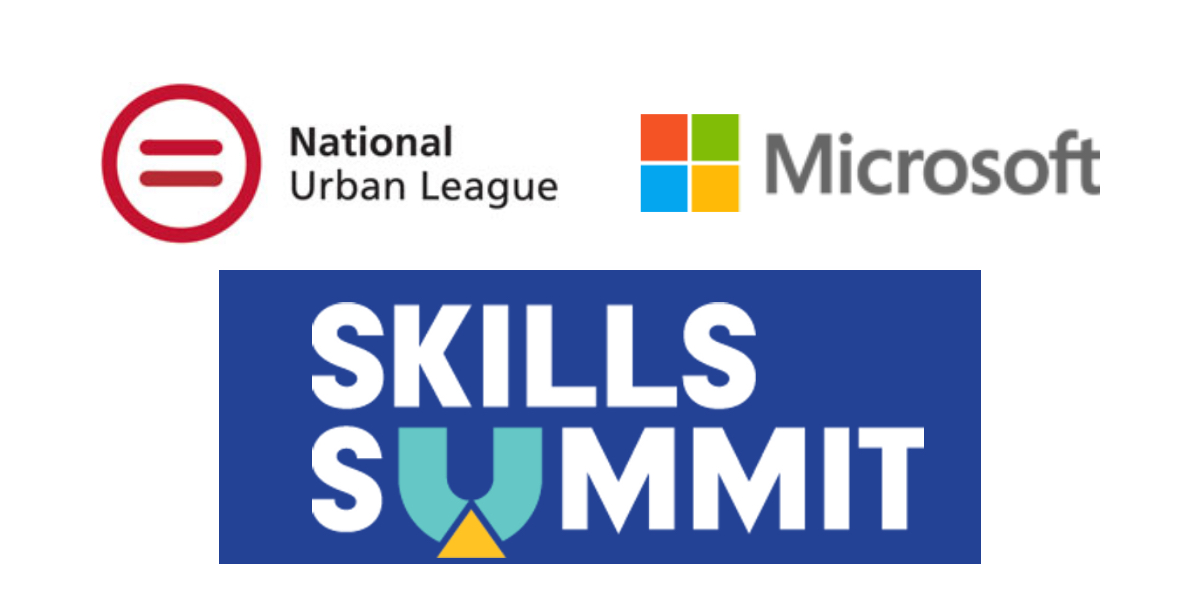Washington, D.C., March 9 – The 2022 National Skills Summit shined a spotlight on several signature initiatives that are working to close the digital skill divide and advance greater equity in the workforce. This included the work of the National Urban League and Microsoft.
Showcasing the work of the National Urban League was Executive VP & COO Donald R. Cravins, Jr., who spoke about the Lewis Latimer Plan for Digital Equity and Inclusion. Prior to the pandemic, families and individuals relied on public spaces like libraries and schools to access the internet. Due to the pandemic, access to these spaces disappeared right when people needed them more than ever, as essential functions of life began operating remotely. Mr. Cravins called for centering black and brown workers in the work of closing the digital divide “as part of a new industrial revolution that benefits people of color and women owned businesses.”
Cravins also detailed the Main Street Marshall Plan. This plan is focused on ensuring that forward-thinking federal infrastructure investments translate into jobs, business development and economic growth in urban communities. “There is a need to ensure that the people in those urban areas where infrastructure projects are happening can get the skills training to fill those jobs,” Cravins said, highlighting a major gap in previous federal infrastructure investments. He went on to add that “small business owners need guidance in how to participate in the infrastructure bill so that they can be prepared for upcoming opportunities. Small business development centers can also be a resource for providing information to small businesses free of charge.”
The National Urban League also recently released a detailed policy paper entitled “From Page to Progress: Bringing the Latimer Plan to Life Through Infrastructure and Job Act Funding.” This paper includes detailed recommendations for policy makers about how to make sure that the dollars for connectivity and technology get to the people who need them. This depends on an apolitical distribution of funds, avoiding block grants/proposals, and requiring states to outline how they will work with local entities in applying their plan.
Portia Wu, Managing Director of U.S. Public Policy at Microsoft, spoke at length about a wide range of initiatives that the company is championing around digital equity. First up, Wu talked about the five-year long Racial Equity Initiative she currently is leading. “The pandemic accelerated a digital transformation that has the potential to widen the digital equity divide,” Wu said. “It is one thing to have broadband, have it be affordable, maybe even have a device, but if you can’t make use of that device. . . then we are still failing to get people on that path to success.”
Security is also an issue that needs to factor into broader discusses about equity. As such, Ms. Wu talked about Microsoft’s new cybersecurity initiative. “Businesses need access to professionals in the cybersecurity industry to keep their businesses and assets safe,” Wu observed, adding that “currently there is a shortage of skilled workers.” To close this gap, Microsoft is providing grants for community colleges to expand their capacity to deliver digital skills training. They also are providing scholarships for students facing barriers to that training.
Microsoft also has developed a state digital equity and inclusion scorecard, in partnership with National Skills Coalition and the National Digital Inclusion Alliance. Ms. Wu shared that the Digital Equity Scorecard gives insight into states’ efforts and the connection between unemployment, digital skills, and economic opportunity. Microsoft and its partners wanted to provide states with a resource to measure, review, and replicate successful efforts.
“The overarching message of this panel discussion was that the pandemic has sped up the need for a digitally skilled workforce, and that now is the time to invest in digital skills training for all workers,” said RespectAbility Policy Apprentice Tammie Stevens. “The pandemic accelerated 10 years of planned technological change in workplaces in less than a year. Without a national strategy to help workers build digital skills throughout their careers, these shifts could deepen racial inequality and slow economic recovery.”
“When it was passed with broad, bipartisan support in 2014, the Workforce Innovation and Opportunity Act (WIOA) invested unprecedented resources into efforts to get people with barriers to employment into the labor force,” said Olegario “Ollie” Cantos VII, RespectAbility’s Chairman. “Now, after the pandemic that has reshaped our economy, it is time to devote significant attention to supporting the economic advancement of students, jobseekers, and entrepreneurs with disabilities. Our nation needs further legislative action and cooperative action to expand effective solutions for jobseekers with significant barriers to employment.”
The success or failure of getting more people with disabilities integrated into the workforce impacts thousands of communities and millions of families nationwide. According to the Census Bureau, there are more than fifty-six million Americans living with a disability. Disabilities include visible conditions such as spinal cord injuries, visual impairments or hearing loss and non-visible disabilities such as learning disabilities, mental health, or autism.
For the latest news on disability policy issues, follow The RespectAbility Report.

Be First to Comment